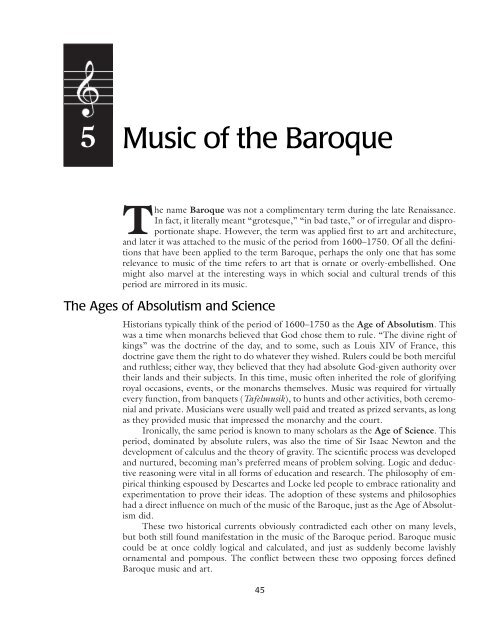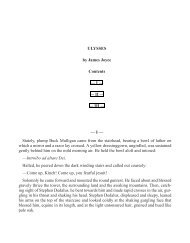Composer Profile - Activefolio
Composer Profile - Activefolio
Composer Profile - Activefolio
You also want an ePaper? Increase the reach of your titles
YUMPU automatically turns print PDFs into web optimized ePapers that Google loves.
5<br />
Music of the Baroque<br />
The name Baroque was not a complimentary term during the late Renaissance.<br />
In fact, it literally meant “grotesque,” “in bad taste,” or of irregular and disproportionate<br />
shape. However, the term was applied first to art and architecture,<br />
and later it was attached to the music of the period from 1600–1750. Of all the definitions<br />
that have been applied to the term Baroque, perhaps the only one that has some<br />
relevance to music of the time refers to art that is ornate or overly-embellished. One<br />
might also marvel at the interesting ways in which social and cultural trends of this<br />
period are mirrored in its music.<br />
The Ages of Absolutism and Science<br />
Historians typically think of the period of 1600–1750 as the Age of Absolutism. This<br />
was a time when monarchs believed that God chose them to rule. “The divine right of<br />
kings” was the doctrine of the day, and to some, such as Louis XIV of France, this<br />
doctrine gave them the right to do whatever they wished. Rulers could be both merciful<br />
and ruthless; either way, they believed that they had absolute God-given authority over<br />
their lands and their subjects. In this time, music often inherited the role of glorifying<br />
royal occasions, events, or the monarchs themselves. Music was required for virtually<br />
every function, from banquets (Tafelmusik), to hunts and other activities, both ceremonial<br />
and private. Musicians were usually well paid and treated as prized servants, as long<br />
as they provided music that impressed the monarchy and the court.<br />
Ironically, the same period is known to many scholars as the Age of Science. This<br />
period, dominated by absolute rulers, was also the time of Sir Isaac Newton and the<br />
development of calculus and the theory of gravity. The scientific process was developed<br />
and nurtured, becoming man’s preferred means of problem solving. Logic and deductive<br />
reasoning were vital in all forms of education and research. The philosophy of empirical<br />
thinking espoused by Descartes and Locke led people to embrace rationality and<br />
experimentation to prove their ideas. The adoption of these systems and philosophies<br />
had a direct influence on much of the music of the Baroque, just as the Age of Absolutism<br />
did.<br />
These two historical currents obviously contradicted each other on many levels,<br />
but both still found manifestation in the music of the Baroque period. Baroque music<br />
could be at once coldly logical and calculated, and just as suddenly become lavishly<br />
ornamental and pompous. The conflict between these two opposing forces defined<br />
Baroque music and art.<br />
45



